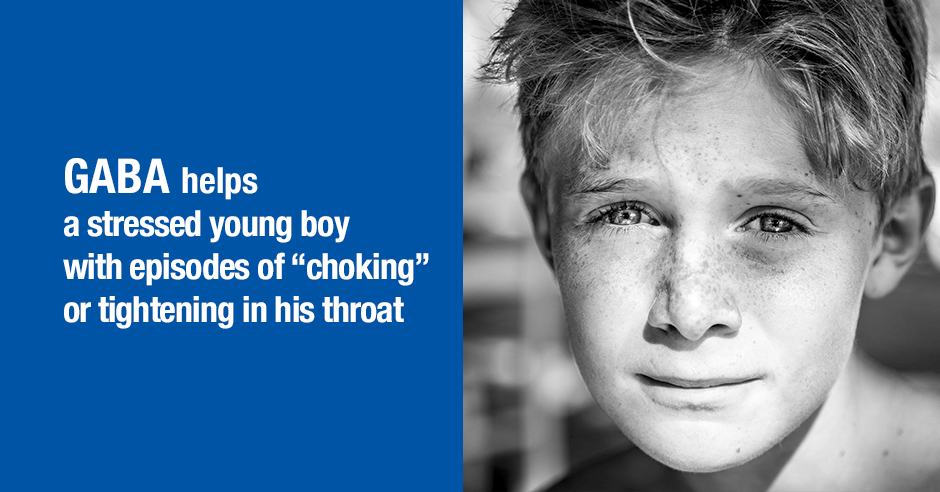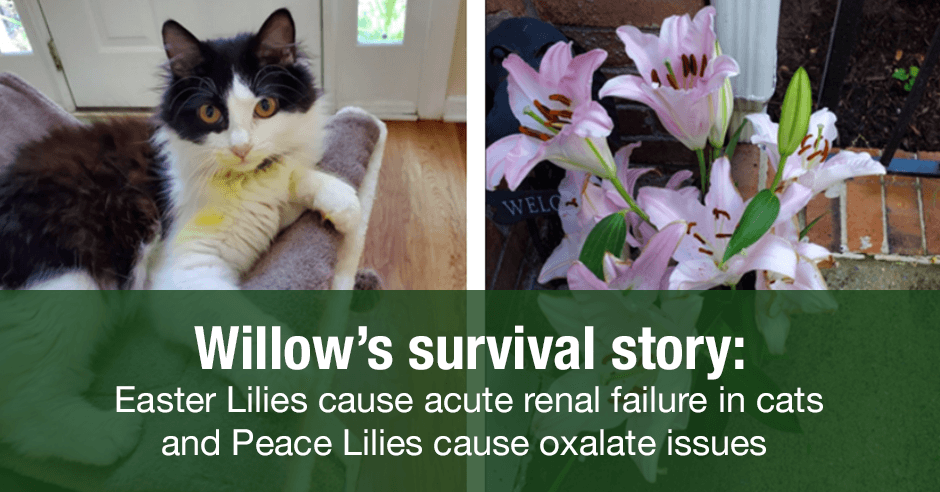
Earlier this year I blogged about how the calming amino acid GABA is often a solution for both anxiety and globus pharyngeus (lump in the throat) and a mom shared this about her son’s episodes of “choking” or tightening in his throat (to the point that he cannot swallow), especially when school stress gets high:
My son, (8 y.o.) has a history of public school use of physical aversion intervention for behaviors that result from a significant language impairment often reports “choking” or tightening in his throat to the point that he cannot swallow. When school stress gets high, he ceases to swallow his saliva which creates a long period of “spitting” out substances including food and natural spit as he is fearful of “choking” to death. During panic attacks he immediately reports “choking” which furthers his panic. You are the first practitioner I have come across that has explained the relationship between globus pharyngeus, stress reaction and low GABA levels. I always felt his throat tightening (involuntary muscle response) was a stress response but was not aware of it’s connection to GABA levels. Thank you for this informative piece!
I voiced my concern for what her son was going through and how I can’t imagine how scary it must be for someone his age, asking her to keep us updated on his progress.
And just over a month later she reported the success her son was having with GABA:
We started a GABA supplement which has positively impacted my son. While he still struggles with hypersalivation when in distress or anxious, his self-reports of feeling like he is “choking” or his throat is closing, has not been present since GABA has been started. We are about a month in and I am inspired that we will continue to have progress. I have been referring to your work as a source to everyone I know that struggles with anxiety. Thank you for all that you do from a very grateful parent.
What wonderful results for her son! Getting feedback like this warms my heart and I appreciate her for sharing so I can share here.
I did ask what GABA product he was using, how much/how often he uses it and how quickly he noticed an improvement but did not hear back. My recommendation is 125mg to start for adults and less for children and I like the GABA Calm product as it’s a sublingual form and easy to use for kids.
I also commented on the fact that he still has “hypersalivation when in distress or anxious.” I would focus on trying to reduce the anxiety with higher doses of GABA and also consider addressing low serotonin because of the anxiety, panic attacks and being “fearful of “choking” to death”.
The anxiety could trigger hypersalivation but the hypersalivation could also be as a result of a food sensitivity like gluten or dairy. Both these and other food sensitivities could also contribute to low GABA/low serotonin and be a trigger for anxiety.
Of course, bullying at school should always be considered and so should the social anxiety condition pyroluria, speech therapy, gut health and vagus nerve support.
Could this be a case of laryngopharyngeal reflux (LPR)?
I always like to try and connect the dots and wonder if this could be a case of laryngopharyngeal reflux (LPR)? I don’t know but it’s possible. This paper, Laryngopharyngeal reflux: A confounding cause of aerodigestive dysfunction, states that LPR is “defined by the retrograde passage of gastric contents beyond the upper oesophageal sphincter, with contamination of the larynx, pharynx and lungs” and states that “half of the laryngeal complaints referred to ear, nose and throat (ENT) services are ultimately diagnosed as LPR.
It also mentions globus pharyngeus and dysphagia (which is difficulty swallowing), sharing that changes in pH suggest reflux occurs in “50% of patients with hoarseness, 64% with globus, 55% with chronic cough and 35% with dysphagia.”
This same paper reports that “30% of patients with LPR-like symptoms report anxiety, compared with 6% of healthy controls.”
Prevalence of reflux disease in children and LPR symptoms by age
This paper, Laryngopharyngeal Reflux Disease in Children, reports that “Although the exact prevalence is unknown, it is estimated that nearly 1 in 5 children likely suffers from reflux disease.” This 1 in 5 number is for both GERD (gastroesophageal reflux disease) and LPR.
The authors also share that it usually presents with a different set of symptoms depending on age:
- Infants typically present with regurgitation, vomiting, dysphagia [difficulty swallowing], anorexia, failure to thrive, apnea, recurrent croup, laryngomalacia [softening of the laryngeal structure], subglottic stenosis [narrowing of the airway], or chronic respiratory issues.
- School-age children tend to demonstrate chronic cough, dyspnea [shortness of breath], dysphonia [hoarseness], persistent sore throat, halitosis [bad breath], and globus sensation.
- Older children may also complain of regurgitation, heartburn, vomiting, nausea, or have chronic respiratory issues.
Low levels of GABA, a calming neurotransmitter
In case you’re new to GABA: low levels of GABA, a calming neurotransmitter can lead to anxiety, fears and panic attacks. With low GABA, the anxiety is a physical kind of anxiety with muscle tension or muscle spasms. Low GABA may be one possible root cause of globus pharyngeus, which leads to a rather scary golf-ball-like lump or constriction in the throat – or as this young boy describes, episodes of “choking” or tightening in his throat.
The amino acid GABA raises GABA levels and in this instance helps ease this tightening, choking or throat muscle spasms.
To be clear, there is no research (yet) on the use of the amino acid GABA for these types of symptoms, however in one study gabapentin was compared to baclofen for the treatment of gastro-oesophageal reflux-induced chronic cough and in another study there were improvements with both proton pump inhibitors and gabapentin for globus pharyngeus. If GABA works I’m all for it, rather than these medications, which do have a long list of side-effects.
Has your child been diagnosed with globus pharyngeus or laryngopharyngeal reflux disease?
Have you observed episodes like this in your child, personally or with clients/patients and has GABA helped?
Have you found other contributing factors like low serotonin, food sensitivities, gut issues, vagus nerve issues or pyroluria?
Feel free to post your questions here on the blog too.


